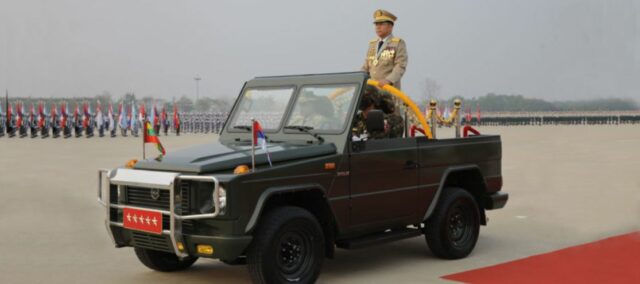The leader of Myanmar’s military coup admits he didn’t expect to see huge popular opposition to his rule and acknowledged that more than three months after the takeover, his regime still could not fully control the country.
The candid confessions by Senior General Min Aung Hlaing came during an interview with Hong Kong-based Chinese language broadcaster Phoenix Television on May 20. It was aired on the military-owned Myawady TV on Thursday night.
Min Aung Hlaing staged a coup February 1, claiming that the then-ruling National League for Democracy (NLD) government led by Daw Aung San Suu Kyi had committed voter fraud during last year’s general election. The NLD won a landslide victory with more than 80 per cent of the parliamentary seats in that election.
Following the coup, hundreds of thousands of Myanmar people from all walks of life peacefully took to the streets across the country to show their opposition to the takeover. They questioned Min Aung Hlaing’s claims by shouting slogans like “Respect Our Votes,” while others called for the release of Daw Aung San Suu Kyi and the President U Win Myint. Both had been arrested at the time of the takeover and are now facing multiple charges filed by the regime. What the protesters across the country had in common was their opposition against military rule.
In addition to the street protests, civil servants from health, education, transportation and other sectors boycotted the regime, vowing that they would be only back to work when the elected government was in power. The civil disobedience movement (CDM) paralysed the junta and its administration has struggled to cope. Now, more than four months on, the regime is still feeling the heat.
When asked by the Phoenix interviewer if he expected such kind of resistance, Min Aung Hlaing replied: “I have to say I didn’t think it would be that much.”
He said he considered the protests to be an emotional reaction, saying that his claims of voter fraud would anger NLD voters. He also claimed that some of those protesting were dishonest individuals who feared they could face legal charges. He didn’t elaborate who the dishonest people might be or what they might have done wrong. But given his claims of vote riggings, it may be likely that he was referring to some NLD members and any role they could have played in alleged voting fraud.
Caught off guard by the intensity of the protests, the regime responded brutally by shooting down protesters in the streets, while also conducting raids on homes and mass arrests. The killing spree was in its high gear in March and April.
Despite the regime’s use of lethal force, the resistance did not wane. Instead, many took up to arms, mostly rudimentary hunting rifles, while some young people sought military training with ethnic armed groups, hoping to join the People’s Defense Force, an armed wing by Myanmar’s parallel National Unity Government (NUG).
As a result, Myanmar has now seen bombings targeting the junta’s administrative machinery and deadly armed attacks on the regime soldiers and police in urban areas. In the country’s north and south, local ethnic armed groups who are not happy with the coup launched a series of deadly offensive attacks on regime troops. Guerrilla attacks by local civilian resistance groups in the country’s northwestern and southeastern regions have given the regime troops there deadly blows as well.
Reflecting on the fact that the current crisis has stretched more than three months (at the time of the interview) since the coup, the Phoenix interviewer asked whether the current situation in Myanmar is now under control, the coup leader said not at all.
“I can’t say they are now 100 per cent under control. There are still some destructive activities in some areas,” he said.
As to the protest-related death tolls, the coup leader rejected the widely cited number of more than 700 (at the time of the interview in May), saying that figure is inflated.
“The actual number is around 300,” he said, claiming the deaths were the result of protesters turning to violence. He added: “There will be some casualties when necessary responses are made.”
The actual number of deaths at the hands of the regime since the coup is 845 as of Thursday, according to the Assistance Association for Political Prisoners-Burma (AAPP), an activist group monitoring arrests and fatalities committed by the regime.
The coup leader also complained that the media have turned a blind eye to the deaths of 47 police personnel during the crackdowns. “It’s not fair the media is only paying attention to the inflated death tolls while keeping silent on the police who gave up their lives,” he said.
(By arrangement with ‘The Irrawaddy’)
















